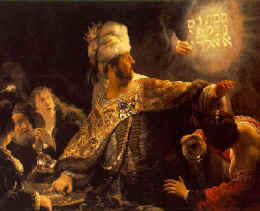
Daniel is one of my favorite books of the Bible, right up there with (but not in front of) the Samuels and the Wisdom Literature. I've written before about my favorite 3 words in the book: "but if not," and the cool story of their timely use in military history, at a time that the culture was familiar enough with the scriptures to recognize their singular usage.
But perhaps one of my favorite stories in the whole book is that of "the writing on the wall" (yet another modern phrase of Biblical heritage). Daniel 5 is rife with the intricate details of Belshazzar's profane orgy and the immediate and visible response of an angered God. After seeing the hand writing on the wall in response to his sin, the king is reminded of Daniel's ability to interpret - those Babylonian kings seemed to have serious memory problems. The king offered Daniel the third most powerful position in the land, and Daniel's response was fascinating - though he had accepted kingly rewards before and would again later - he told the king to stow his rewards and then began translating all the same. He was swift and harsh with the king, in stern contrast to the tender and affectionate ways in which he begged Nebuchadnezzer (Bel's father) to repent.
And while the reasons for his behavior and attitude may remain somewhat mysterious to us, he made quite clear the offense that Belshazzar had committed, and then translated the writing on the wall just as clearly. Belshazzar was true to his word and rewarded Daniel immediately, and God was true to his word, as Belshazzar didn't live to see the next morning, when his kingdom was divided.
In my most recent study of Daniel, I noted an interesting similarity between the Babylonian kings and the people of Israel. So many times, reading through the Old Testament, you see the continual, repetitive, incredibly stupid acts of the Israelites as they return, time and again, to their sin. Like a dog to its vomit, as the proverb said. And they are admonished, and they repent. And sooner or later, every time, they go back to their sin. And the cycle continues. I've long thought that God provided us with the constant repetition of their history to drum into our heads what our lives of sin must look like in His eyes. We are no better than the Israelites, no better than the kings of Babylon.
And yet we have the joyful knowledge that when we, like Belshazzar, are weighed on the scale, we will not be found wanting. Much of the rest of Daniel covers his prophecies that point to the "son of man" that Jesus later identified himself to be - the Son that stands with us as we are weighed and pronounces us to be without any want.















No comments:
Post a Comment